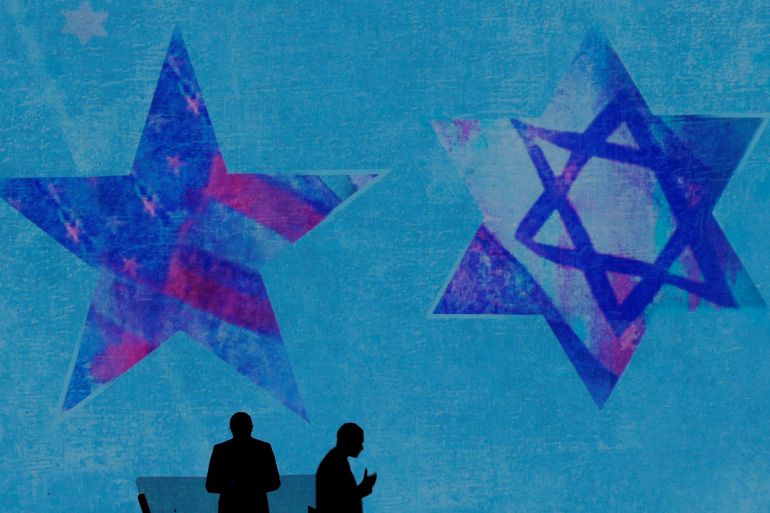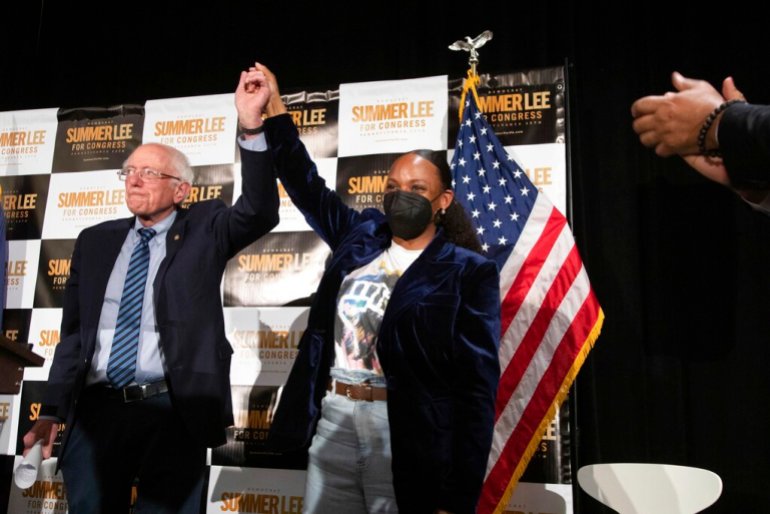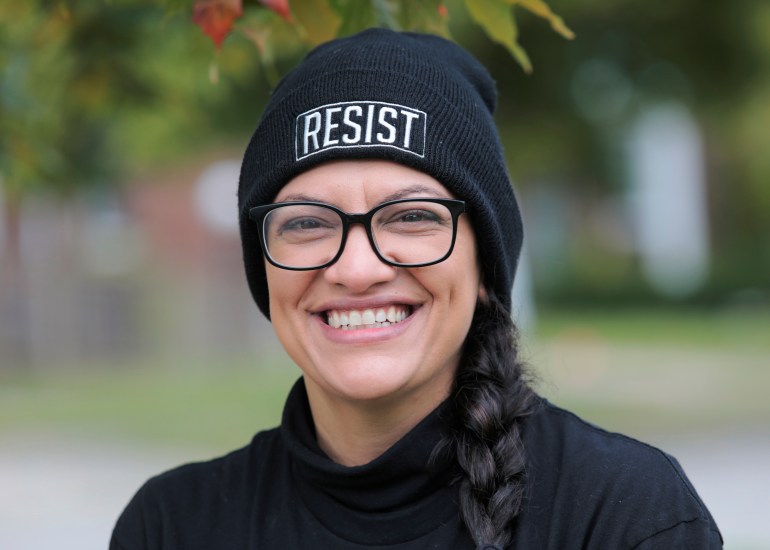US elections: How pro-Israel spending affects Palestine advocacy
Despite massive AIPAC spending in Democratic primaries, advocates say debate over US support for Israel not going away.

Washington, DC – With the largest pro-Israel lobby group in the United States getting directly involved in electoral politics for the first time, the American Israel Public Affairs Committee (AIPAC) is leading a push to influence Democratic congressional primaries across the country.
AIPAC and other pro-Israel groups are pouring millions of dollars into Democratic Party races, largely to bolster opponents to left-wing candidates, federal election disclosures show.
Keep reading
list of 3 itemsAIPAC accused of Islamophobia after attacks on Ilhan Omar
Shireen Abu Akleh: Who said what in US Congress on slain reporter
While some Palestinian rights advocates fear these efforts may deter politicians from speaking out against Israeli abuses, they say it nevertheless demonstrates the broader gains of the Palestine solidarity movement in the US.
James Zogby, president of the Arab American Institute (AAI), a Washington-based think-tank, said the push before critical November midterms has come in response to a growing chasm on Israel between progressive Democrats and the party’s centrist old guard.
“They were losing [support] among progressives, and so, they decided that they would stomp them out with millions of dollars of ads instead of recognising that the split is real,” Zogby told Al Jazeera.
“This is not an issue that’s going away.”
Super PACs
For years, activists have complained about the unregulated flow of money in US elections and the undue influence it grants corporations and special interest groups over the democratic process.
Under US law, political action committees – commonly referred to as PACs – and individuals can contribute only limited funds directly to political candidates.
However, in a 2010 decision, the Supreme Court ruled that free speech protections guaranteed by the First Amendment of the US Constitution give entities the right to spend unlimited amounts of money to oppose or support candidates.
While limits on direct donations still apply, the landmark court case – Citizens United v FEC – unleashed a new, decisive force in US elections: super PACs, entities that raise millions of dollars and spend the money independently, for example, through ads, in support of a cause or a candidate with very few regulations. This allows for advocacy as long as the groups do not directly coordinate with campaigns.
Until this year, AIPAC had stayed away from direct electioneering; the group did not donate money to or endorse candidates as an organisation. “The mission of AIPAC is to encourage and persuade the U.S. government to enact specific policies that create a strong, enduring and mutually beneficial relationship with our ally Israel,” the group says on its website.
But last year, the lobby group launched a PAC – AIPAC PAC – and a super PAC, United Democracy Project (UDP). Since then, it has used the PAC to encourage supporters to donate to its favoured candidates and transferred money directly to their campaigns, and used the super PAC to also back and oppose candidates through ads.
With this approach, critics of Israel “faced insurmountable challenges to winning seats in Washington”, AIPAC PAC Director Marilyn Rosenthal told supporters in an email last month.
AIPAC did not respond to Al Jazeera’s requests for comment.
Mixed results
So far, after primaries in a handful of states – including key races in Ohio, Pennsylvania, North Carolina and Texas – before the November midterms, the results have been a mixed bag for AIPAC and its allies.
While pro-Israel groups celebrated the election of several candidates, progressives have remained competitive and won a few races. Left-wing activists have been especially jubilant about the victory of Summer Lee in a Democratic House primary in the Pittsburgh area last month.
Lee, a Pennsylvania state legislator, survived massive late spending by pro-Israel groups that translated into attack ads against her.
But on the same night that Lee declared victory, AIPAC celebrated the win of three candidates it had backed with millions of dollars in North Carolina, including Valerie Foushee, who defeated Nida Allam, a local politician who was looking to become the fifth-ever Muslim member of Congress.
It remains unclear how much the spending by pro-Israel groups has influenced these contests. House primaries, where victory requires only tens of thousands of votes, are local in nature because of the relatively small number of voters.
“In our very broken electoral system, money matters,” said Beth Miller, political director at JVP Action, a political advocacy group linked to Jewish Voice for Peace, a Jewish-American organisation that supports Palestinian rights.
“In a genuine representative democracy money would not play the role it plays here, but it does. And these anti-Palestinian groups are dropping a lot of money. And so, we can’t pretend that that won’t have an impact; it will.”

Democratic primaries as a battleground
Pro-Israel spending in US politics is not new. Organisations like NORPAC and Pro-Israel America have raised money for pro-Israel candidates from both major parties for decades.
The late billionaire Sheldon Adelson spent hundreds of millions of dollars in support of Republican politicians – including former President Donald Trump – with a focus on Israel policy. On the Democratic side, Israeli-American investor Haim Saban has similarly donated generously for the party’s top candidates while advocating for unquestioning support for Israel.
However, in recent years, Democratic primaries have become a major focus of pro-Israel groups. In 2018 and 2020, several progressive politicians supportive of Palestinian rights were elected to Congress, joining a handful of Israel critics already there.
Although they remain a small minority, they are a vocal one. Once unthinkable in mainstream US politics, positions such as conditioning aid to Israel and accusing the country of committing apartheid are now being openly discussed in the halls of Congress.
And because progressives who are championing these ideas are mostly elected in districts that are almost certain to elect Democrats, Democratic primaries emerged at the forefront of efforts to protect an eroding pro-Israel bipartisan consensus.
In 2019, advocates with links to AIPAC founded the Democratic Majority for Israel (DMFI) with the goal of maintaining the Democratic Party’s pro-Israel policies.
DMFI made headlines the following year when it ran ads against Senator Bernie Sanders – a vocal advocate of universal human rights, including those of Palestinians. The anti-Sanders material focused on his electability and health, not positions on Israel.
That strategy of not mentioning Israel would become the rubric for attacking progressives in an electoral landscape in which American voters do not rank foreign policy among their top priorities.
“Winning Democratic primary races in overwhelming Democratic districts won’t change the partisan makeup of Congress, but it will determine whether more pro-Israel Democrats, or anti-Israel Democrats, are elected. It will determine whether today’s small but potent anti-Israel Squad grows to become a sizable anti-Israel caucus,” AIPAC said in another email to supporters last month, referring to a group of progressive women of colour in Congress.
Targeting Rashida Tlaib
Beyond open seats and protecting pro-Israel incumbents, Israel lobby groups also appear to have set their sights on defeating some sitting members of “the Squad“.
Last month, a new pro-Israel PAC was announced, with the main aim of unseating Rashida Tlaib, of Michigan – the only current Palestinian-American member of Congress.
In its founding statement, first reported by Politico, the Urban Empowerment Action (UEA) PAC pledged to spend $1m to help Tlaib’s main primary opponent, Janice Winfrey.
“UEA PAC’s premier race will be in Michigan’s 12th Congressional District, where the group plans to spend upwards of $1,000,000 on TV, digital, mail, radio, and print advertising to support Detroit City Clerk Janice Winfrey in her campaign to restore infrastructure, improve educational opportunities in the district, and support the Biden-Harris agenda in DC,” it read.
UEA PAC has said its purpose is to back candidates “advancing policies that will improve the lives of African-Americans”.
However, Bakari Sellers, a TV pundit and former South Carolina state representative, who is backing the PAC, acknowledged in an interview with Politico that Tlaib’s criticism of Israel is “definitely high up on the list” of reasons the group is trying to unseat her.
Moreover, one of the group’s top donors so far has donated millions of dollars to Republican and pro-Israel campaigns and PACs over the years, Federal Election Commission (FEC) public records show.

In a statement to Politico, Tlaib’s campaign called on the congresswoman’s opponent to “immediately disavow and condemn this type of Big Money attack on our democracy”. Al Jazeera was not able to reach UEA through an email address listed on its website.
While AIPAC has officially thrown its hat into the elections ring, other groups with a similar mission have continued to spend money in opposition of Israel’s critics. For example, DMFI PAC is running ads against Congresswoman Marie Newman, who has signed on to numerous measures in support of Palestinian human rights.
“DMFI PAC only endorses Democrats. More than 55% of DMFI PAC’s Independent Expenditure spending this cycle helped candidates of color,” the group told Al Jazeera in a statement last week. “Our endorsement and spending decisions are made based on the candidates’ views on issues central to us: support for the Democratic agenda, which includes strong support for the US-Israel relationship.”
‘Single-issue’ group
Meanwhile, AIPAC’s new PAC has endorsed dozens of Republicans who have refused to certify President Joe Biden’s election victory – drawing the ire of Democrats and others who describe these lawmakers as “insurrectionists” who attempted to overthrow American democracy.
The lobby group justified its support for these GOP legislators by saying it is a “single-issue” organisation committed to strengthening Israel-US ties.
“AIPAC stands with pro-Israel Democrats and Republicans,” Senator Bernie Sanders wrote on Twitter last month, criticising the group. “They stand with Republican insurrectionists who refused to certify Biden’s election. But, mostly, they stand with billionaires who want a ‘two-party’ system that is united in support of large corporations and the rich.”
Other politicians have also gone on the offensive against the pro-Israel lobby.
Congressman Andy Levin, a Michigan Democrat who is running against fellow incumbent Haley Stevens after redistricting in the midwestern state, accused AIPAC, which is backing his opponent, of “undermining our democracy”.
“It’s not about getting endorsed by AIPAC; it’s about taking hundreds of thousands of dollars from them and then also taking money from other corporate PACs that also are supporting insurrectionist Republicans,” he said during a debate with Stevens.
AIPAC stands with pro-Israel Democrats and Republicans. They stand with Republican insurrectionists who refused to certify Biden’s election. But, mostly, they stand with billionaires who want a "two-party" system that is united in support of large corporations and the rich. https://t.co/bws6ub9n1w
— Bernie Sanders (@BernieSanders) May 13, 2022
Long-term effect
Pro-Israel groups are not the only super PACs spending heavily in Democratic primaries. In some instances, progressive candidates – mostly fuelled by small donations – have outraised their centrist opponents.
Still, Palestine advocates have said the pro-Israel spending skews the conversation around Israel-Palestine and disrupts democracy.
George Bisharat, a Palestinian-American professor at UC Hastings College of the Law in San Francisco, noted that most Americans support conditioning aid to Israel – a 2021 poll showed 51 percent of respondents supported such a move (PDF) – but the position is only embraced by a handful of members of Congress.
He said the gap between public opinion and official US government policy on Palestine, as well as on other issues such as gun control, shows that “the democratic will of the people is subverted” by “highly resourced and highly focused” special interest groups.
“That is a challenge for us all in implementing a foreign policy that is more humane, that’s wiser, that’s more just and that ultimately serves our interests better,” he told Al Jazeera.
Bisharat said the recent election spending could make politicians think twice before criticising Israel, but it will not curtail the wider trend of questioning Washington’s support for a country that has been accused of committing apartheid against Palestinians by Amnesty International, Human Rights Watch and other rights organisations.
“The pro-Israel forces – especially the hardline ‘support the Israeli government unconditionally’ – that group realises that it’s losing its grip on the people, and on the discourse,” he said, citing the Harvard Crimson’s recent endorsement of the Boycott, Divestment and Sanctions (BDS) movement as one example.
For her part, Miller of JVP Action said pro-Israel groups may celebrate winning a few races now, but in the long term, the enormous spending will hurt their cause.
“They are showing very clearly to this whole country what their real priorities are and where their fears lie. They are showing that they’re willing to spend millions and millions of dollars to desperately try to keep out anyone who will put actual people, working families, human rights, first,” Miller told Al Jazeera.
“And I think that they’re doing it in a way that is actually getting attention brought on to them that will harm them in the long haul and help the Palestinian rights movement.”